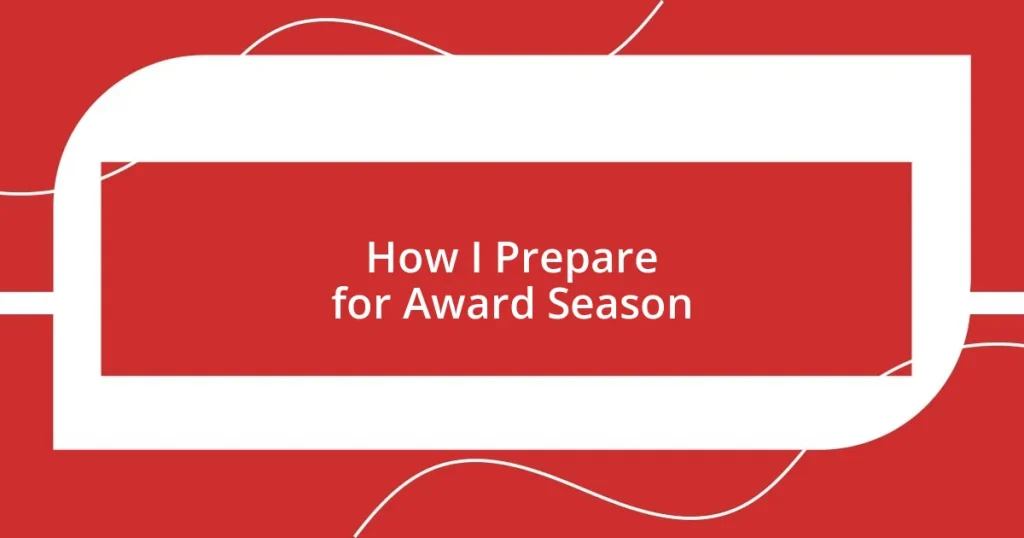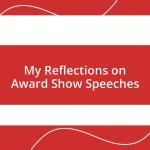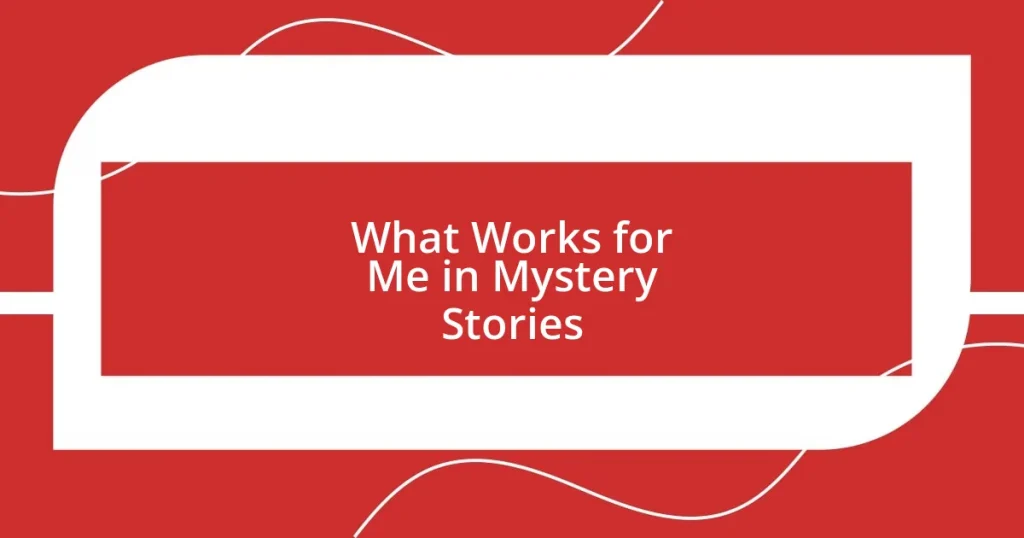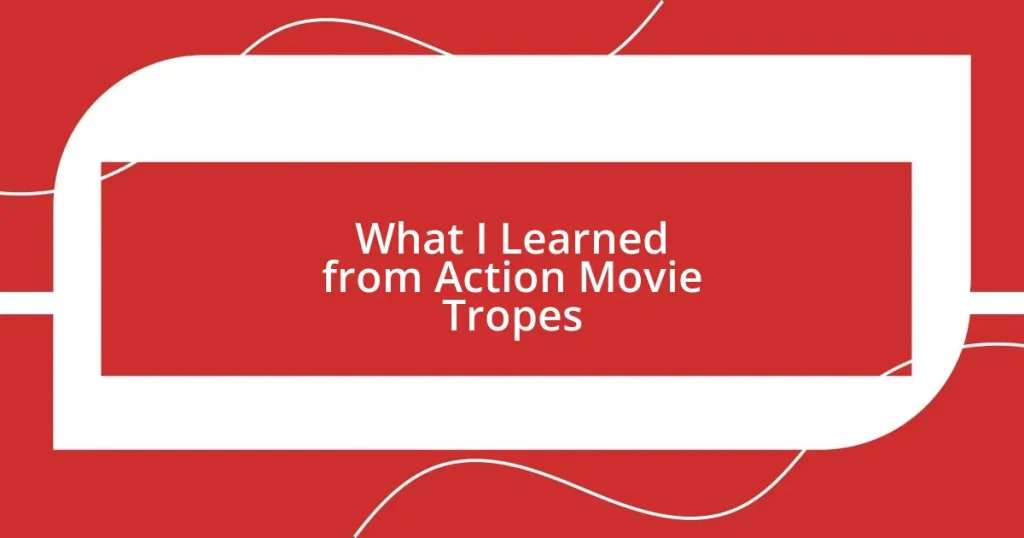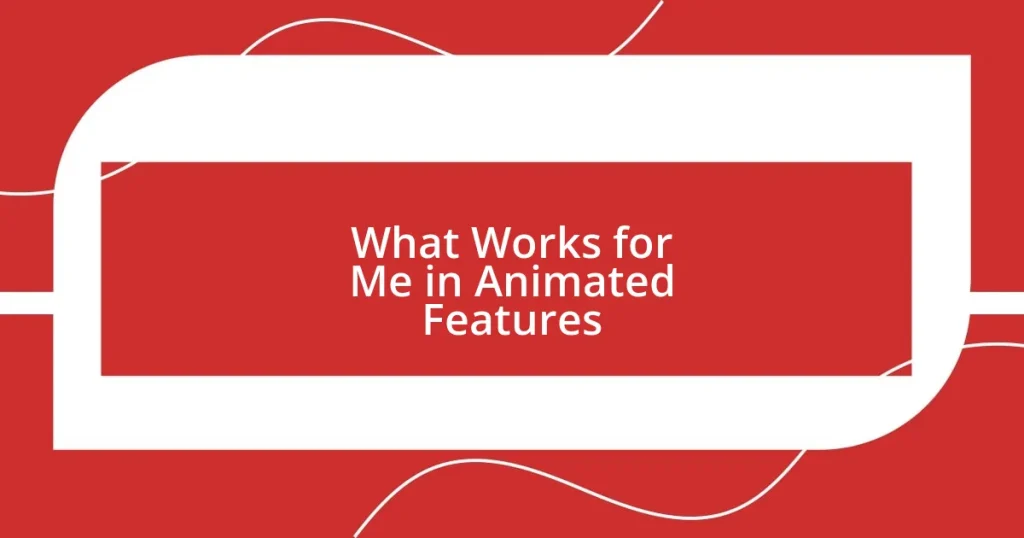Key takeaways:
- Award season signifies recognition for hard work and reflects societal values, encouraging diverse voices and stories.
- Researching major award shows involves understanding their significance, historical context, and creating systematic comparison tables for predictions.
- Staying organized with a comprehensive calendar, submission materials, and networking enhances engagement and preparation for award season.
- Practicing presentations, seeking feedback, and staying updated on trends fosters confidence and sparks creativity in preparation for awards.
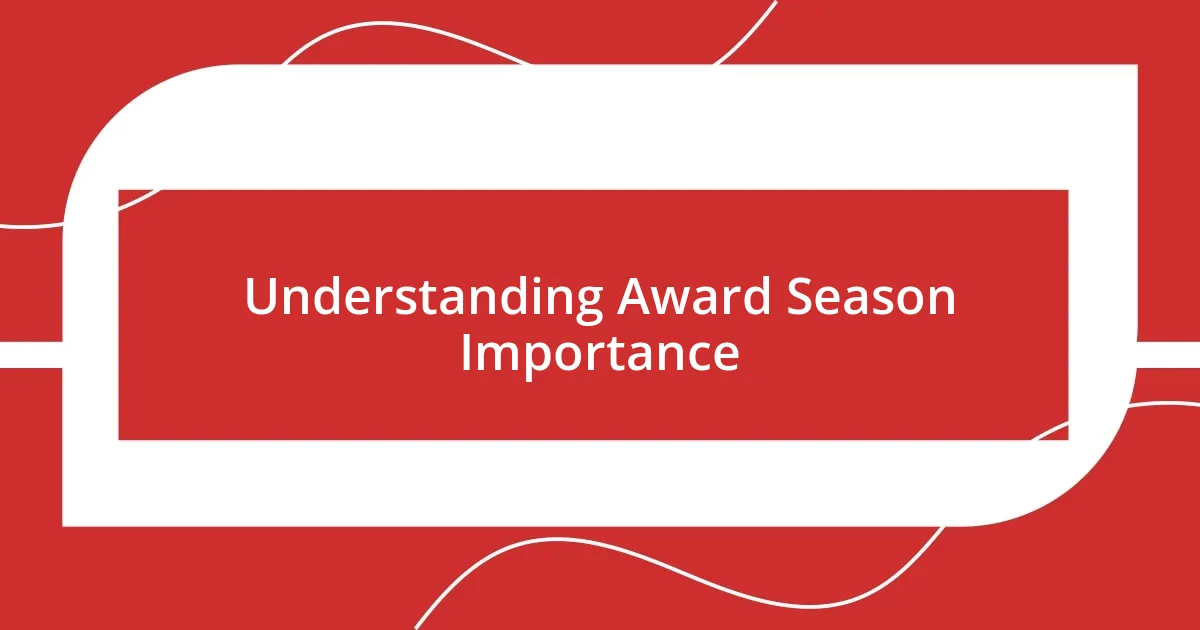
Understanding Award Season Importance
The importance of award season isn’t just about the glitz and glamour; it represents a moment of recognition for countless hours of hard work. I remember the first time I saw my favorite film receive an award; it felt like validation for the entire team involved, as if their dedication was finally acknowledged. Isn’t it inspiring to witness passion being celebrated so publicly?
Award season also serves as a reflection of societal values and narratives. When I look at the nominees each year, I often find myself thinking about what stories we’re choosing to elevate. How can we ignore the power of representation? It’s through these awards that we see a shift in the cultural dialogue, encouraging more diverse voices to be heard.
Additionally, the anticipation and excitement surrounding the announcements can ignite a sense of community among fans. I often find myself glued to the screen alongside friends, discussing predictions and sharing our hopes for our favorites. Doesn’t it feel unifying to root for someone, all while learning about their journey? These moments not only celebrate excellence in various fields but also strengthen connections among those who share similar passions.
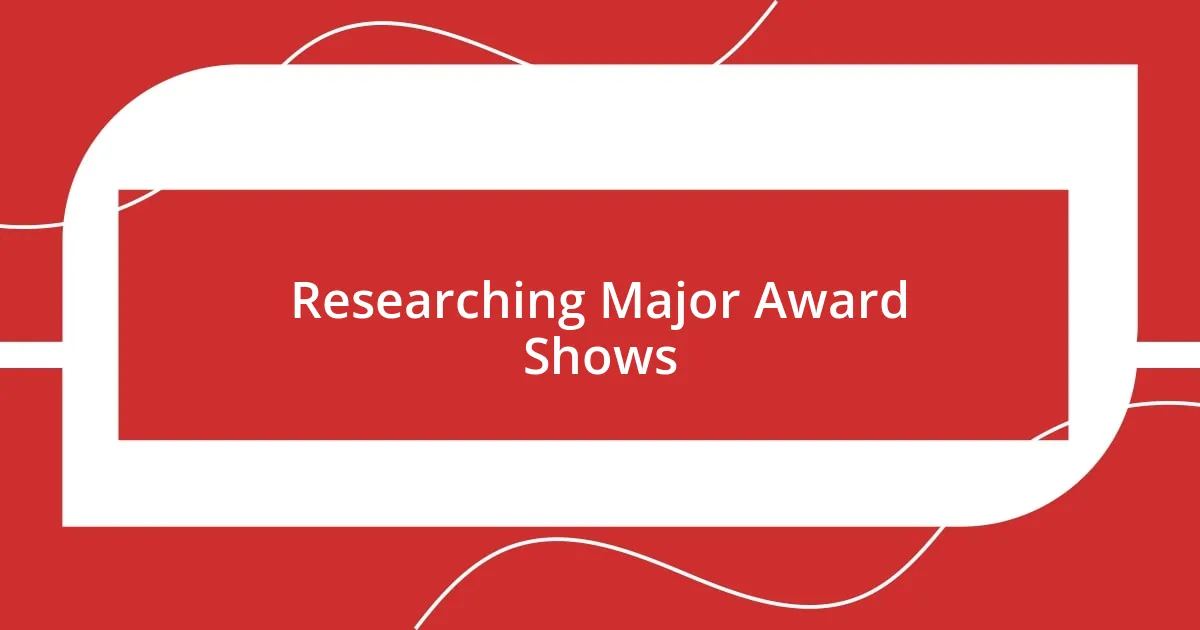
Researching Major Award Shows
When diving into researching major award shows, I find it essential to start by understanding the specific awards’ significance and criteria. Each show, whether it’s the Oscars, Golden Globes, or Emmys, has its own unique legacy and rules that shape what wins and why. I distinctly recall studying the history of one award show before a viewing party; I was amazed to discover how trends have ebbed and flowed over the decades, reflecting cultural shifts and audience preferences.
The nominees tell a story of their own, often highlighting the prevalent themes within the industry. I like to analyze who gets nominated and why—for instance, the #MeToo movement, which stirred conversation and change. I remember discussing this with friends while binge-watching films before an awards night; it added a layer of depth to our viewing experience and allowed us to appreciate the subtleties we might have missed otherwise.
To make my research systematic, I often create comparison tables that clearly outline the nominees, their previous wins, and notable performances. This approach not only helps me keep track but also serves as a visual guide during discussions. I’ve found this method invaluable, especially when trying to predict the outcomes during awards season festivities.
| Award Show | Notable Characteristics |
|---|---|
| Oscars | Focuses on films; known for cinematic excellence and has a global influence. |
| Golden Globes | Recognizes film and television; often seen as a precursor to the Oscars. |
| Emmys | Highlights television shows and performances, reflecting evolving trends in media. |
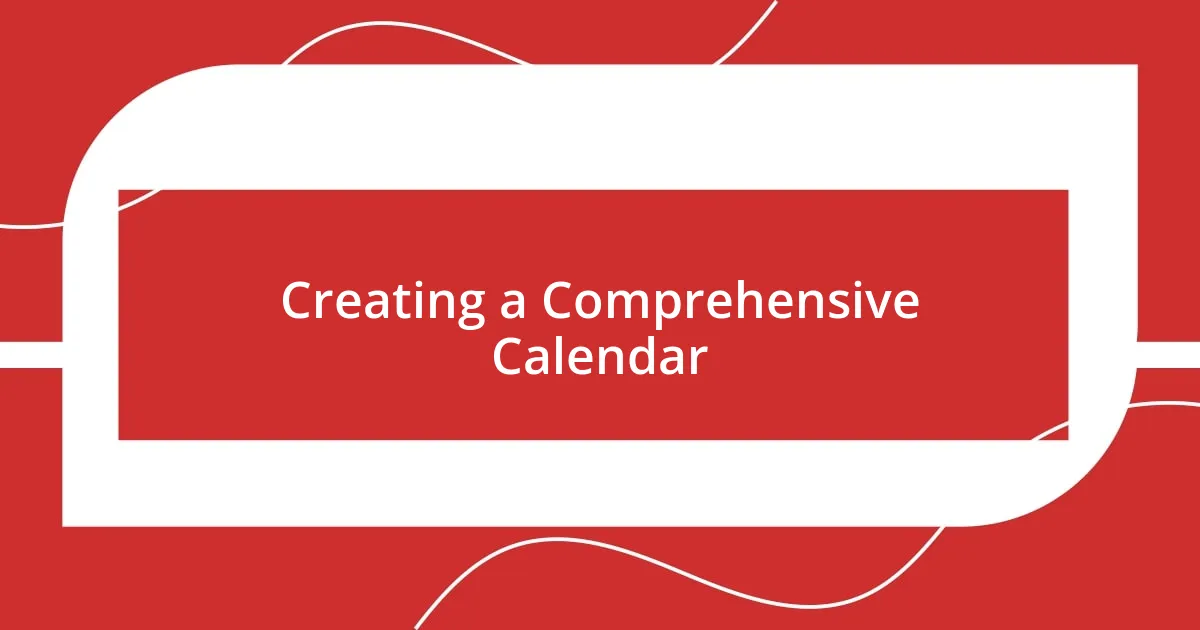
Creating a Comprehensive Calendar
Creating a comprehensive calendar is crucial for staying organized during award season. I always start by marking the key dates for each major award show. This helps me avoid double-booking and ensures I don’t miss any important announcements or ceremonies. I vividly remember when I mistakenly scheduled a dinner on the same night as the Golden Globes; it turned into a scramble to catch up on highlights later!
Here’s how I typically outline my calendar:
- Nomination Announcements: A crucial time to get hyped about potential winners.
- Voting Deadlines: Important for understanding when opinions can shift.
- Awards Ceremonies: Don’t forget to block out the time for actual viewing.
- Post-Awards Discussions: I love diving into conversations about the outcomes right after the shows.
Every year, I’ve found that this methodical approach allows me to immerse myself fully in the season without losing track of the excitement. Balancing my social plans with the award show schedule transforms it from an event into a shared experience, making every moment count.

Organizing Submission Materials
Organizing submission materials is another essential step for award season that I take quite seriously. I remember the first time I dived into this task; the chaos of papers and digital files was overwhelming. So, I developed a system of categorization that has saved me countless hours. I often use folders on my computer, labeled by category—scripts, endorsements, and promotional materials. This allows me to locate everything easily and ensures that I’m not scrambling last minute.
Another tip is to maintain a checklist of required materials for each submission. I can’t tell you how many times I’ve overlooked a simple element, like a bio or a production still, and realized too late. Keeping a curated list helps me feel confident that I’m presenting a complete package, which is invaluable when deadlines loom. It’s almost like packing for a trip—you don’t want to forget anything crucial!
I also like to schedule a dedicated space of time leading up to submissions to review and refine my materials. It’s quite an eye-opener to see how much my work can evolve with just a bit of extra polish. Have you ever felt that thrill when everything clicks into place? That’s exactly what happens when I take the time to ensure my submission materials reflect the best version of my efforts. The clarity it brings is not just about organization; it’s about presenting my work in a way that truly resonates!
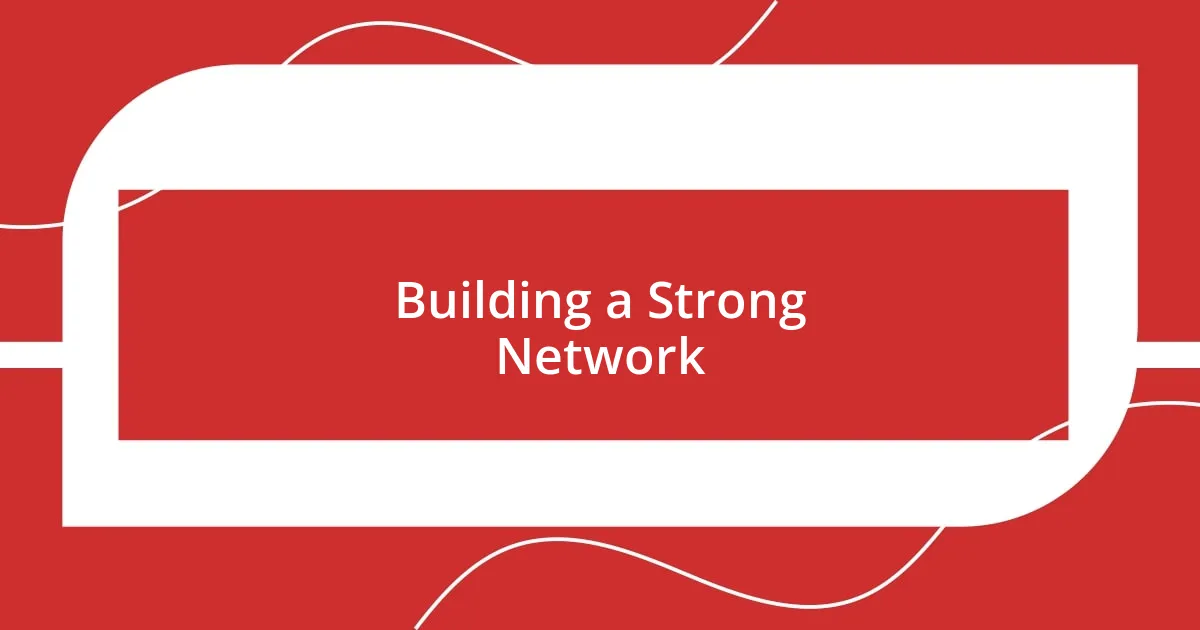
Building a Strong Network
Building a strong network is one of the most rewarding aspects of preparing for award season. I remember the first time I attended a pre-awards networking event; I felt out of place, but I soon discovered the magic of connecting with like-minded individuals. Sharing stories and insights with peers can lead to unexpected opportunities, and often, you find that collaborating with others elevates your own work. Have you ever forged a friendship that blossomed into a professional partnership? Those connections can be more powerful than we realize.
To truly cultivate your network, I’ve learned that it’s vital to keep nurturing those relationships well beyond award season. I host casual meet-ups or coffee catch-ups—not just for professional reasons, but to genuinely reconnect. It’s amazing how a simple conversation can rekindle an old collaboration or lead to a fresh idea. Every time I engage with my contacts, I feel more invested in not only their journey but also my own. Don’t underestimate the impact of maintaining those connections; sometimes, just sharing a supportive message can brighten someone’s day and strengthen your bond.
Furthermore, I suggest leveraging social media platforms to showcase your work and engage with others in the industry. I often share my thoughts on recent projects or award outcomes, prompting discussions that help me stay relevant. I remember posting my take on a film that won an award last year; not only did it spark conversations, but it also caught the attention of an industry peer who later reached out, leading to a collaborative project. Isn’t it incredible how a single post can create lasting opportunities? Building a strong network isn’t just about who you know; it’s about creating a community that inspires and uplifts one another throughout the award season and beyond.
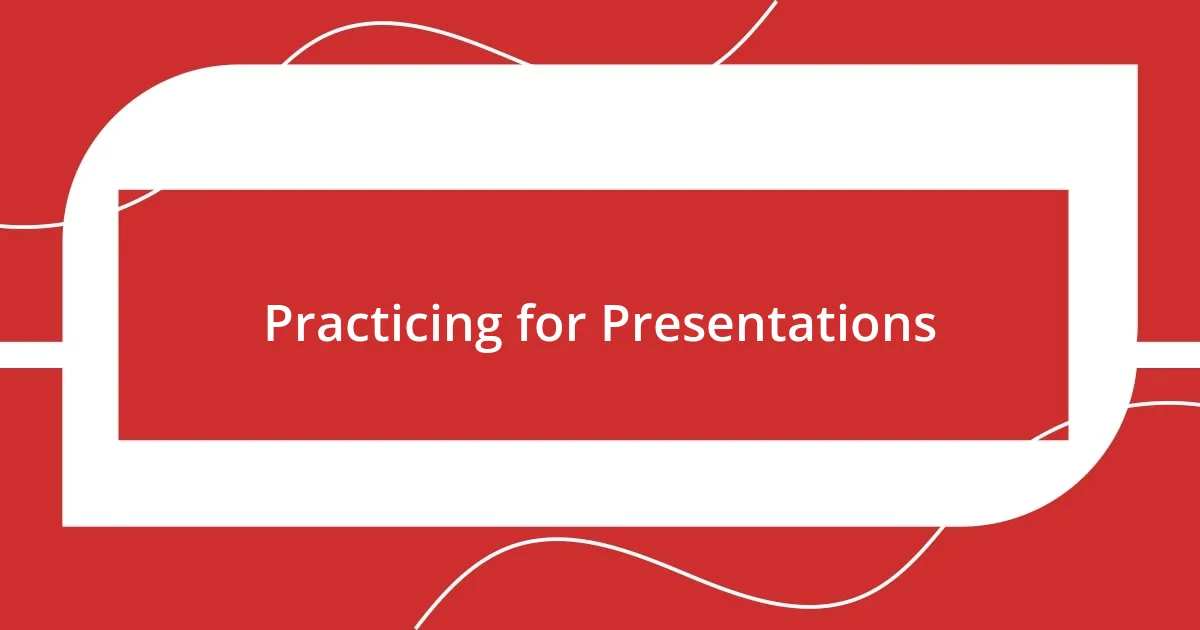
Practicing for Presentations
Practicing for presentations is an essential part of my preparation for award season. I still remember the nerves I felt during my first big presentation—my heart raced, and my palms were sweaty. To combat that, I’ve developed a routine where I rehearse multiple times in front of a mirror. It’s amazing how seeing my expressions helps me adjust my delivery. Have you ever practiced until you felt every word was ingrained in your muscle memory? That’s the kind of confidence that comes with repetition.
Another technique I often use is recording myself while rehearsing. Listening back reveals nuances I wouldn’t notice otherwise, like my tone or pacing. The first time I did this, I was shocked at how monotonous I sounded. By adjusting my inflections, I could truly convey my passion for the work! This process is like tuning an instrument; you refine it until it sings. How often do we actually take the time to listen to ourselves? It’s not just about fixing mistakes; it’s about evolving into a more engaging presenter.
Finally, I always seek feedback from trusted friends or colleagues. Sharing my presentation with them often leads to new insights I wouldn’t have considered alone. I remember one instance when a friend suggested I tell a personal story related to my topic. That simple addition transformed my presentation from being good to memorable! Engaging your audience through personal connection can make all the difference, don’t you think? Each conversation about my approach excites me and encourages growth, making the final delivery even more impactful.
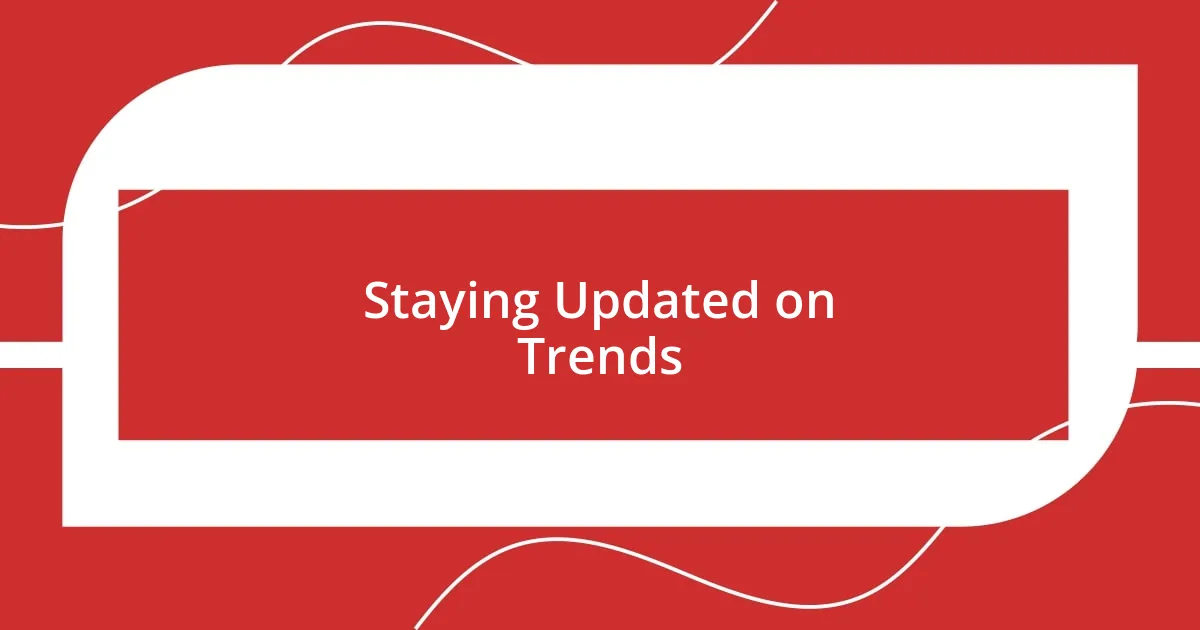
Staying Updated on Trends
Staying updated on trends is crucial for me as I prepare for award season. I often find myself scrolling through industry-specific websites, reading articles, and watching video reviews to grasp the new waves in storytelling and presentation styles. Just the other day, I stumbled upon a piece discussing the rise of immersive experiences in film—this kind of insight can spark new ideas for my own projects. Have you ever come across a trend that made you rethink your approach? It’s those moments of realization that keep my creativity flowing.
Social media is a fantastic tool for monitoring trends, as I can witness real-time discussions and reactions from audiences. When I noticed a growing appreciation for documentaries last year, it inspired me to dive deeper into that genre, both in viewing and creating. I remember sharing my excitement about a particularly impactful doc on my social feed, which prompted a solid debate among my followers. Isn’t it invigorating how a simple post can lead to a meaningful conversation about what resonates with people?
Another strategy I find effective is attending industry panels and film festivals. I once attended a panel where accomplished filmmakers discussed their favorite storytelling techniques. Hearing their insights firsthand sparked my imagination in ways I hadn’t expected. Engaging with professionals in these settings not only updates me on trends but also offers a glimpse into the passion that drives their work. Have you experienced that electric atmosphere in similar environments? The energy shared can be contagious, making it easier to stay inspired and aware of the latest developments leading into award season.










